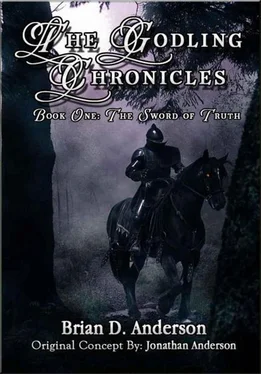Brian Anderson - The Sword of Truth
Здесь есть возможность читать онлайн «Brian Anderson - The Sword of Truth» весь текст электронной книги совершенно бесплатно (целиком полную версию без сокращений). В некоторых случаях можно слушать аудио, скачать через торрент в формате fb2 и присутствует краткое содержание. Жанр: Фэнтези, на английском языке. Описание произведения, (предисловие) а так же отзывы посетителей доступны на портале библиотеки ЛибКат.
- Название:The Sword of Truth
- Автор:
- Жанр:
- Год:неизвестен
- ISBN:нет данных
- Рейтинг книги:3 / 5. Голосов: 1
-
Избранное:Добавить в избранное
- Отзывы:
-
Ваша оценка:
- 60
- 1
- 2
- 3
- 4
- 5
The Sword of Truth: краткое содержание, описание и аннотация
Предлагаем к чтению аннотацию, описание, краткое содержание или предисловие (зависит от того, что написал сам автор книги «The Sword of Truth»). Если вы не нашли необходимую информацию о книге — напишите в комментариях, мы постараемся отыскать её.
The Sword of Truth — читать онлайн бесплатно полную книгу (весь текст) целиком
Ниже представлен текст книги, разбитый по страницам. Система сохранения места последней прочитанной страницы, позволяет с удобством читать онлайн бесплатно книгу «The Sword of Truth», без необходимости каждый раз заново искать на чём Вы остановились. Поставьте закладку, и сможете в любой момент перейти на страницу, на которой закончили чтение.
Интервал:
Закладка:
Kaylia was silent.
“The story Brother Salvo told about the Demon King,” said Gewey. “Have you heard it before?”
“Yes,” said Kaylia “Though it’s told differently among my people. In our tales, he’s a hero.”
“How could someone called the ‘Demon King’ be a hero?” asked Gewey.
Kaylia laughed and said, “We don’t call him the ‘Demon King,’ we simply call him King Ratsterfel. In our stories, he stood up to the tyranny of the Gods and tried to free the world.”
“I wonder which story is true,” Gewey said pensively.
“Perhaps neither,” Kaylia replied. “It was long ago, and storytelling among my people is not what it was. Much of our history was lost with the fall of our Nations."
“That must be hard,” said Gewey. “My people depend on their stories as a way to connect them to our ancestors. If we didn’t have them, we’d be lost.”
“You keep referring to the humans as ‘your’ people,” she said.
“Yet they are not. Being raised human does not make you human.
If they found out what you are, do you think they would bow down and worship you, or would they run in fear and disgust? Though I admit the monks surprised me with their kindness and selflessness, I wonder how kind would they have been if they discovered what I am? What if they knew they had shared a meal with an elf? Do you think they would just ignore it and smile?”
“And what about your people?” interjected Lee, who had been listening from the front of the wagon. “They want to murder you just for traveling with humans. Are they any better?”
“You’re right, half-man,” Kaylia acknowledged. “The old hatreds run deep on both sides. I cannot claim differently. Perhaps on this journey we can find a way to change that.”
“Wouldn’t that be something,” Millet added. “Now that would be an adventure I would be proud to be part of.”
“I think you speak for us all, old friend,” said Lee.
For the rest of the morning conversation between Kaylia and Lee was more civil than usual. They even exchanged a few stories while Gewey listened with a pleased grin.
It was just before noon when they reached the gates of Kaltinor. They expected the gates to be open during the day, but instead they were shut tight and protected by four members of the city guard. Millet pulled up and halted the wagon.
“What’s your business?” the guard captain inquired. As the captain spoke with Millet, the other three guards moved to the back of the wagon and looked inside. Gewey and Kaylia bowed their heads and stayed quiet.
“We’re just pilgrims passing through,” said Millet.
“Pilgrims, you say?” said the captain. “I’m sure you saw the monks camped back the way you came, and I’m sure they told you the temples will not receive you. We have no room here for a bunch of poor pilgrims. Best you move on.”
“They did tell us,” Millet affirmed. “All the same, we are just passing through.” He reached down and handed something to the guard captain.
The captain looked at it for a moment, then quickly put it in his pocket. “Your stay here can be no longer than three days. Any longer and you’ll be arrested. Understand?”
Millet nodded. “Completely.”
The captain ordered his men to open the gates. Millet glanced over at Lee and sighed with relief. There was a loud screech of metal on metal as the gates slowly swung open. Millet urged the horses forward and passed through.
“We’ve managed to bribe our way through the gates with little problem,” said Lee. “Let’s see if our luck holds at the temple.” He glanced back at Gewey. “If you want, you can walk beside the wagon. I know you’ve never seen a city before, and you won’t
see much of it from back there.”Gewey smiled with excitement and leapt from the wagon.
The streets of Kaltinor were thirty feet wide and paved with smooth stones. Most of the buildings along the main avenue were two stories tall; the bottom floors held shops of all kinds, while the upper floors held residences where Gewey could see people eating and talking on small balconies. In just a few minutes, he had counted at least five taverns and three inns-a far cry from what he’d grown up with in Sharpstone. People of all kinds surrounded him; commoners, lords, monks, and merchants all moved about at a pace that astounded him. In the distance, towering above it all, stood a large manor of deep gray stone. At four stories high, it was by far the largest building Gewey had ever seen.
“What do you think, young master?” Millet asked. Gewey could barely hear him over the noise of the city.
“It’s amazing,” he said breathlessly. “I can’t imagine what it would be like to live here.”
“Like living in a hornets’ nest,” muttered Kaylia, who had jumped down beside Gewey. “It’s unnatural.”
“I agree,” said Millet. “Over the years I’ve come to appreciate living in the country.”
Lee laughed. “So I guess all that about hating the smell of horses and pigs, not to mention the constant complaining about not having proper shops and clothing was nothing but hogwash.”
“Not hogwash, my lord,” answered Millet. “I guess I’ve just changed more than I realized.”
“We’ve both changed,” said Lee, thoughtfully.
They wound their way west through the city’s temple district and approached the Temple of Ayliazarah. The temple was made from red granite and bore elaborate carvings of the Goddess along the outer wall. In the front, a stone staircase led upward to an arched entranceway, with two large oak doors. Statues of Ayliazarah, each holding a harp in one hand and the Moon in the other, stood on the either side of the door.
Millet stopped the wagon and they climbed down.
“Remember,” Millet advised. “Speak only when spoken to, and say nothing of what Brother Salvo told us.”
When they got to the door, Millet pounded it several times with his fist. It opened a few moments later, and there stood an old woman dressed in fine white linen robes embroidered with intricate interlacing gold patterns. Her head was covered in a thin gold silk scarf and she carried a long white ash walking stick.
“What’s your business here?” the old woman asked.
“We’re pilgrims on our way to the Temple of the Far Sky,” replied Millet. “We thought we might stay the night and see the temple while we’re here.”
“You thought wrong,” said the woman. “We have no room for vagabonds. Be gone.” She started to close the door, but Millet’s hand shot out and stopped her.
“We are not vagabonds,” Millet said sternly. “As I said, we are pilgrims, and we demand entrance to the temple.”
“You demand ?” the woman scoffed. “You will leave now, or I will call the city guards.”
“Who is it?” asked a woman’s voice from within the temple.
“What do they want?”
“It’s no one, Your Holiness,” the old woman replied, turning her head inside the door. “Riff-raff, nothing more.”
“Let them in,” said the voice. “Let me see this ‘riff-raff,’ if you please.”
The old woman glowered at Millet as she slowly opened the door.
Once inside, they saw a floor made from polished black marble that spanned an enormous room lined with gold columns. The walls were covered with tapestries and frescoes depicting the nine gods, and several immense glass chandeliers hung from the twenty-foot ceiling. In the center of the room stood a ten-foot statue of Ayliazarah exactly like those outside the door, but this one was made of solid gold. At the far end were two spiral staircases leading to the upper level.
Just inside the door stood a woman dressed in white satin robes.
She was holding a large, leather-bound book. She was younger than the woman who answered the door by at least twenty years, although her face looked careworn. Her light brown hair fell down her shoulders in tight curls ornamented with tiny white flowers. She smiled brightly at Millet and the rest as they entered.
Читать дальшеИнтервал:
Закладка:
Похожие книги на «The Sword of Truth»
Представляем Вашему вниманию похожие книги на «The Sword of Truth» списком для выбора. Мы отобрали схожую по названию и смыслу литературу в надежде предоставить читателям больше вариантов отыскать новые, интересные, ещё непрочитанные произведения.
Обсуждение, отзывы о книге «The Sword of Truth» и просто собственные мнения читателей. Оставьте ваши комментарии, напишите, что Вы думаете о произведении, его смысле или главных героях. Укажите что конкретно понравилось, а что нет, и почему Вы так считаете.












